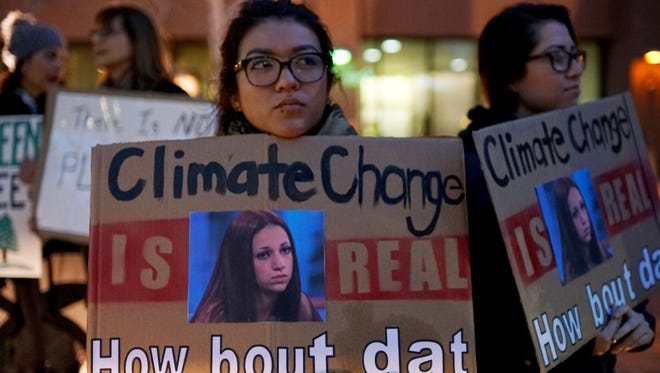U.S. increasingly isolated on climate: David Andelman
World leadership and moral high ground hinge on whether Trump exits the Paris agreement.
President Trump is keeping a host of his campaign promises on energy and the environment. Coal-fired power plants could get a new lease on life. The handcuffs are coming off the nation’s automakers. They’ll no longer need to worry about raising fuel efficiency standards to 54 mpg by 2025. Oil pipeline projects are back from the dead and Exxon Mobil is pressing ahead with $20 billion in new refineries along America’s Gulf Coast.

Two years ago, more than 175 countries agreed to restrain just these types of activities in a common drive to slow climate change and the threats it poses. Even the United States signed on to the Paris agreement. But now we have denier in chief Donald Trump. The overwhelming scientific consensus is that climate change is real and carbon pollution from fossil fuels like oil and coal is the most important cause. Yet Trump has said that global warming was “created by and for the Chinese in order to make U.S. manufacturing non-competitive.”
His views have not moderated since that 2012 tweet, as he demonstrated with his appointment of climate skeptic Scott Pruitt to head the Environmental Protection Agency. Trump continues to build much of his agenda on foundations laid by chief strategist Stephen Bannon and the Breitbart News website Bannon used to run. Breitbart seized on reports that the National Oceanic and Atmospheric Administration “deliberately fiddled the climate data to hide the ‘pause’ in global warming in time for the UN’s COP21 Paris talks,” calling them the perfect excuse to cut NOAA’s budget.
Fact-checker Snopes found the reports false, but Trump nevertheless is seeking a 17% cut for NOAA, the leading climate control and monitoring agency. He’s reportedly proposing an even deeper 25% cut to the EPA budget and a 30% cut for an Energy Department office that researches and promotes renewables and efficiency.
A serious Republican idea on climate change: Our view
No time to waste as islands disappear: Column
Virtually all other countries — even longtime climate deniers and horrific polluters like China and India — have come to recognize the existential danger to their people, if not the planet, by man-made production of greenhouse gases. And they are putting in place programs to curb them, often at considerable cost to development. China’s leadership has only to look outside its windows in Beijing to see citizens staggering through blinding pollution, their faces covered with masks.
Those 175-plus countries gathered near Paris two years ago signed a sweeping and unprecedented agreement to put a brake on practices that are destroying the atmosphere of our planet. Trump, buffeted by competing viewpoints within his administration, could well blow apart the agreement and at the same time deal a body blow to U.S. leadership in the world.
In Marrakesh, Morocco last year, China’s senior climate negotiator, Zou Ji, observed that “Proactively taking action against climate change will improve China's international image and allow it to occupy the moral high ground.” The U.S. seems to be rapidly abandoning that high ground it has occupied for so long, and increasingly becoming an outlier.
POLICING THE USA: A look at race, justice, media
Climate change is real, but Paris treaty won't fix it: Column
In France, even far-right presidential candidate Marine Le Pen, who’s been portrayed as a Gallic Trump, now says she’s not persuaded humans have had no role in global warming. More broadly, the European Union has pronounced itself and its 28 member nations “clearly ready to continue the global leadership on the fight against climate change,” as EU energy commissioner Maros Sefcovic put it. That includes helping the developing world meet its difficult and expensive commitments.
So where does that leave the United States? First, we will certainly be challenged globally if monitoring suggests that America has become the principal source of greenhouse gases degrading the earth’s atmosphere. More immediately, U.S. auto manufacturers will risk their futures if they continue turning out antiquated gas-powered behemoths as other countries begin to follow leaders like Norway. Within eight years, its parliament has said, 100% of all cars on its roads will be electric or hybrid.
If there is any hope for continued U.S. commitment to the Paris agreement, it lies in the somewhat supportive views of the so-far muted Secretary of State Rex Tillerson, previously CEO of Exxon. Ivanka Trump and husband Jared Kushner are also reportedly in Tillerson’s corner, as is Tilleron's successor at Exxon, who says that “climate risks warrant action.” The question is whether even they can go up against Bannon, branded the nation’s “top climate villain” by The New Republic, to move the president off his long-held beliefs on climate. It is a battle vitally worth winning.
David A. Andelman, editor emeritus of World Policy Journal and member of the board of contributors of USA Today, is the author of "A Shattered Peace: Versailles 1919 and the Price We Pay Today." Follow him on Twitter@DavidAndelman.
You can read diverse opinions from our Board of Contributors and other writers on the Opinion front page, on Twitter @USATOpinion and in our daily Opinion newsletter. To submit a letter, comment or column, check our submission guidelines.